Which dental crowns are better
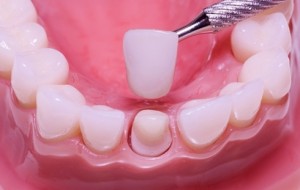
It's no secret that having healthy and beautiful teeth is real happiness!
They not only give a beautiful smile, but also help to maintain health. People who have lost their teeth for one reason or another, very often think about their restoration.
After all, the lack of teeth is not only discomfort, but also a direct path to disease.
An artificial crown is a type of prosthesis. It is installed when it is not possible to restore a decayed tooth with the help of any restorations.
In addition, the timely installed dental crown allows you to maintain the correct bite and restore the aesthetic appearance.
Crowns for teeth are used in all types of prosthetics.
The advantage of crowns is that they help strengthen the tooth and protect it from destructive factors. To install the crown on the tooth, it must first be prepared.
Kinds
By appointment, crowns are:
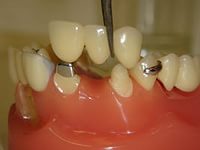
- Restorative. Used to restore damaged teeth.
- Supporting. They are used for bridge prosthetics.
By time of use:
- Long-lasting crowns on teeth. They are set for an indefinite period. They are made from durable, wear-resistant materials.
- Temporary constructions. They are used to protect prepared teeth from infection and exposure to external factors. They are fixed on the turned teeth during the installation of permanent crowns. If the crowns intended for temporary use have a plastic base, then with prolonged use, the formation of an inflammatory process at the place of contact with soft tissues is possible.
Depending on the method of fixation:
- Fixed structures. These include single crowns. They are fixed with special dental cement on a previously prepared tooth. It is possible to apply such constructions even in case of severe loss of tooth tissues and even in the case when only the root or its tissue has been preserved.
- Removable crowns. For example, a removable clasp prosthesis in which a dental crown is mounted.
Designs can be installed on both front teeth and chewing.
In order to correctly choose dental crowns for prosthetics, it is necessary to understand which ones are better for the chewing group and which ones are for the anterior teeth.
- Crowns on the front group of teeth should have excellent aesthetic performance. As an option, these can be constructions made of cermet or of non-metal ceramics.
- Crowns on chewing teeth. There are several options for prosthetics of the chewing group. To restore them, structures made of cermet, metal-free ceramic, metal, combined can be successfully used.
Materials
Crowns for teeth can be made of various materials, depending on the indications and wishes of the patient.
The presence of a large selection of material provides a successful solution to any clinical situation, as well as the reliability of the dental structure.
The functionality and aesthetics of future teeth depend on the material chosen.
Dental structures can be made of materials such as:
- Plastic.
- Ceramics.
- Cermets.
- Metal alloys.
Metal crowns
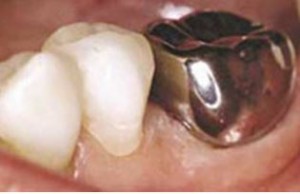
Structures made of metal are one of the oldest methods of prosthetics.
In recent times, stamped crowns were used, which were made from special blanks.
- Such designs did not differ in functionality and good aesthetics.
- To imitate gold, crowns were often coated with titanium nitride sputtering, resulting in a yellow color.
- Stamped structures were not fixed to the tooth accurately enough, as a result of which the gum was injured.
The relative advantage of a stamped crown is its low cost and ease of removal.
In modern conditions, metal dental crowns are performed at a higher level.
- Currently, designs are made by casting, or they are made from solid metal blocks on computerized equipment.
- Features of such structures are precise fit and long service life.
- Fixation of the finished crown is made on a special adhesive for dental crowns, characterized by increased strength.
Given the low aesthetic properties of metal structures, it is advisable to install them on the teeth of the chewing row.
Ideal for those teeth whose life is limited, but there is no indication for their immediate removal.
Gold tooth crowns
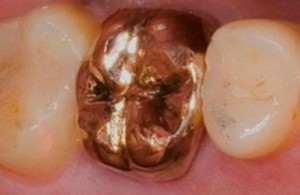
Gold is a metal that has a beneficial effect on the human body and has high biocompatibility with its tissues.
For this reason, the use of gold for the manufacture of prostheses remains relevant.
Whole crowns are made from gold alloys, and they are also used to create a metal-ceramic crown frame.
Gold crowns are recommended for patients who are allergic to other metals.
The cost of gold designs is quite high, but such a price is justified by a combination of advantages.
Ceramic-metal crowns
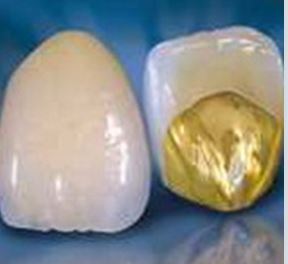
Widespread received designs made of cermets.
- These are crowns that are characterized by the best price-quality ratio.
- The ceramic-metal construction consists of a metal frame lined with ceramics. The metal frame gives the crown strength and the ceramic coating gives an aesthetic appearance.
- Cermet crowns can be installed on both the front and chewing teeth.
- Ceramic-metal constructions provide excellent aesthetics, quite strong and durable, but since the crown includes metal, in some patients they can cause allergies.
Since the metal frame does not transmit light, the cermet crown on the front teeth may look unnatural.
In this regard, in dental practice, crowns made of non-metal ceramics are used for prosthetics of teeth falling into the smile zone.
Metal-free ceramic crowns
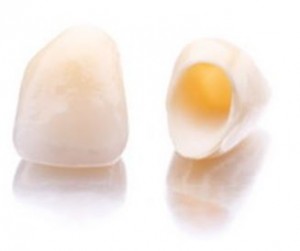
All-ceramic crowns are an alternative to cermet. Such designs are made of porcelain or zirconium dioxide.
- They are almost indistinguishable from natural teeth, but porcelain crowns have one significant drawback. This is an increased fragility.
- For this reason, they recommend prosthetics only the front teeth, which have the least load.
- And since the highest aesthetic requirements are imposed on this group of teeth, the installation of porcelain ceramics will be the best solution.
- Recently, ceramic crowns based on zirconium are made by casting, so it has become possible to carry out their installation on chewing teeth.
- Porcelain crowns can be installed only on a single tooth, and on the basis of zirconium dioxide it is possible to produce bridge structures.
The disadvantage of ceramic crowns is a rather high cost, since the manufacture of such structures is a laborious process.
The cost of porcelain designs is very high for the reason that only a highly qualified specialist can make them.
Video: "Metal-free ceramics"
Plastic crowns
This type of crown is used as temporary.
Plastic structures are fixed before prosthetics with permanent crowns.
Plastic crowns play a protective role and provide a comfortable condition after turning the teeth.
The service life of plastic structures is short and limited by the time taken to produce permanent crowns.
Crowns made of plastic have a lot of disadvantages:
- There is a high probability of injury to the gums.
- Acrylic plastic is a strong allergen.
- The material has a porous structure, which allows bacteria to multiply rapidly in the oral cavity.
- The appearance of spots and darkening of the crown.
- Rapid abrasion due to thin coating.
Metal-plastic constructions
- Such crowns are much cheaper than porcelain or cermet.
- However, they are less durable and subject to rapid wear.
- In addition, as a result of corrosion of the plastic, the color of the teeth will soon change and bad breath will appear.
Titanium tooth crowns
Designs made of titanium dioxide have long been a thing of the past, but nevertheless have the right to exist, at least because of the cheapness and lack of the need to remove a large amount of dental tissue during the preparation process.
Material disadvantages:
- Lack of wear resistance.
- The presence of a flat chewing surface of the tooth.
- Lack of tight fit to the gum and neck of the tooth.
- Lack of aesthetics.
What to choose?
If we talk about the choice of material, the main factor is the financial capabilities of the patient.
When choosing, it is also worth considering some advantages and disadvantages of designs.
| Cermets | Ceramics | |
| Pros: |
|
|
| Minuses: |
|
|
Cost
| Type of crown | Price, rub.) |
| Metal cast crown | From 3000 |
| Cermet crown | From 6000 |
| Zirconia crown | From 14000 |
| Plastic temporary construction | 1000 |